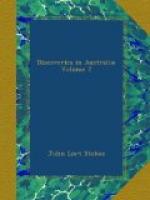Eastern River, found that there was no foundation
for the report. But having got so far away from
the settlement, he ascended the river some little distance,
and towards sunset came on a tribe of natives.
The anchor was let go, and signs were made to induce
them to approach, for some time without success.
At last, however, encouraged by seeing so many of their
own countrymen, two or three of the more courageous
ventured to draw near. The scene that followed
was a curious illustration of the slight communication
that exists between natives of different tribes, and
also of the great difference in their language, as
the strangers could hold no conversation with the
people from Port Essington, who, when they found their
own dialect was not understood, tried to explain themselves
in such few words of broken English as were then used
at the colony, and seemed very much surprised at their
want of success. A large mess of boiled rice,
which had been prepared by way of a feast for the newcomers,
was then produced; but it was not before they saw
their countrymen eagerly devouring it that they could
be induced to eat, as they evidently did not know
what it was. The result of Lieutenant Vallack’s
visit is hostile to the idea entertained that clothes
given to natives at Port Essington pass into the interior,
which I always much doubted. Had the fence before
alluded to by me been run across the neck, and an out-station
formed there, we should have had further acquaintance
with the natives of the main, besides other advantages
that would necessarily have accrued.
As it seemed extremely probable that the course of
events would not again permit the Beagle to visit
Port Essington, we naturally experienced some regret
on our departure, and were led to speculate, with interest,
on its future destiny. A young settlement, so
remote and solitary, cannot fail to awaken the liveliest
sympathy in the voyager. How small soever may
be the circle of its present influence, the experience
of the past teaches us confidently to expect that
wherever a knot of Englishmen locate themselves, there
are deposited the germs of future greatness. For
Port Essington, a sphere of action, of great extent
and importance, appears marked out by the hand of
nature; though, to a careless observer, unskilled
in discerning the undeveloped capabilities of geographical
positions, it may appear in the light simply of an
isolated military post. And, certainly, whatever
may be its actual resources, little or nothing has,
as yet, been done to ascertain them. We are still
reduced to base our opinions on conjecture and hypothesis;
we know nothing of the amount of commerce that might
be carried on with the islands of the Indian Archipelago—nothing
of the productions of the mainland—nothing
of the extent to which colonization might be carried
in the neighbourhood. Without data of this kind
it is impossible, with any pretensions to accuracy,
to estimate the probable future importance of our




